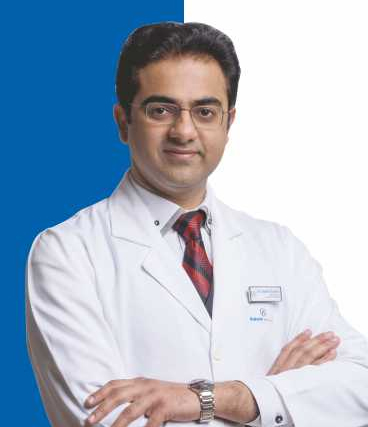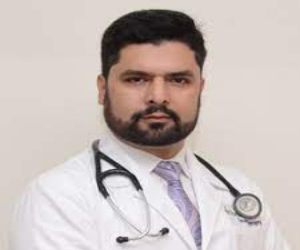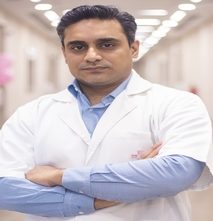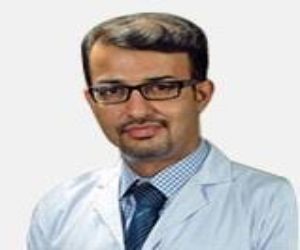
Dr. Rakesh Ojha
Haematologist
 Fortis Hospital Noida
Fortis Hospital Noida
 21 Years of experience
21 Years of experience
About Doctor
Dr. Ojha is qualified by the American Board of Medical Oncology and Hematology across Medical Oncology and Hematology. He holds MBBS, MD, and Diplomate Internal Medicine degrees. He completed his MBBS in 1992 from GSVM Medical College, Kanpur, MD in 1998 from Seton Hall University, New Jersey, Diploma in 1998 from American Board of Internal Medicine, and Fellowship in 2001 from Seton Hall University, Paterson, NJ. Dr. Ojha has held positions of Senior Consultant in Fortis Hospital, Noida, Associate Professor in Temple University, Philadelphia, Visiting Consultant in St. Joseph’s Regional Medical Center Paterson, NJ, Consultant in Bergen Regional Community Blood Center, Paramus, NJ, Junior Consultant in LLRM Medical College, Meerut, and Junior Consultant in King George Medical College, Lucknow.
Qualifications
- MBBS
- MD
Experience
- Senior Consultant, Fortis Hospital, Noida
- Associate Professor, Temple University, Philadelphia, 2005
- Visiting Consultant, St. Josephâs Regional Medical Center Paterson, NJ, 2001
- Consultant, Bergen Regional Community Blood Center, Paramus, NJ, 2000
- Junior Consultant, LLRM Medical College, Meerut, 1994
- Junior Consultant, King George Medical College, Lucknow, 1993
Specialization and Expertise
A medical oncologist specializes in the treatment of different types of cancer with the help of chemotherapy and other methods like targeted therapy or immunotherapy. They are considered the primary health care provider for cancer patients. The doctor works with the other medical departments for the best results. Some of the conditions Dr. Rakesh Ojha treats are:
- Breast and Prostate Cancer
- Primitive Neuroectodermal Tumors
- Oral or Mouth Cancer
- Brain Cancers- Astrocytoma
- Mixed Gliomas
- Metastatic Cancer
- Brain Cancer
- Pancreatic Cancer
- Oligodendrogliomas
- Prostate Cancer
- Ovarian Cancer
- Colon Cancer
- Ependymomas
- Rectal Cancer
- Lung Cancer
- Stomach Cancer
- Certain Types of Cancer that have been Resistant to Chemotherapy and Radiation Treatment (e.g. Melanoma)
- Breast Cancer
- Meningiomas
- Skin Cancer
- Colorectal or Colon Cancer
- Cervical Cancer
Different types of cancer produce different signs and symptoms. It is very crucial to detect cancer in the early stages. Early detection of cancer helps in the effective treatment of cancer. Some of the symptoms look like those produced in other health conditions. It is highly suggested to consult an oncologist who will evaluate the symptoms and will suggest tests to detect cancer. With the advancement of medical technology, a number of diagnostic techniques are available which can effectively diagnose cancer. Some of the common symptoms of cancer are listed below. If you have any of these symptoms, consult a medical oncologist.:
- Persistent cough or trouble breathing
- Skin changes, such as yellowing, darkening or redness of the skin, sores that won’t heal, or changes to existing moles
- Persistent indigestion or discomfort after eating
- Changes in bowel or bladder habits
- Fatigue
- Unexplained bleeding or bruising
- Lump or area of thickening that can be felt under the skin
- Hoarseness
- Difficulty swallowing
- Persistent, unexplained fevers or night sweats
- Persistent, unexplained muscle or joint pain
- Weight changes, including unintended loss or gain
Memberships & Certifications
- American Society of Hematology
- American Society of Blood & Bone Marrow Transplantation
Awards & Accomplishments
- Diploma – Internal Medicine, American Board of Internal Medicine (1998)
- Diploma – Hematology & Medical Oncology, American Board of Internal Medicine (2001)
- Awarded New Jersey Cancer Research Awarded – Scientific Excellence by The New Jersey Commission on Cancer Research (1999)
- Awarded – AMGEN Oncology Research Fellowship Award (1999)
- Awarded – Residents Clinical Cancer Research Paper by the Oncology Society of New Jersey (2001)
- Awarded – Faculty Teaching Award by St. Joseph`s Regional Medical Center, New Jersey (2003)





